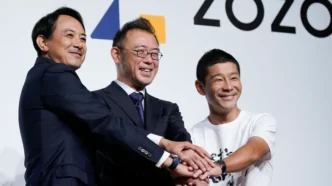Lyst, the UK fashion marketplace that once rode the wave of e-commerce success to a $700 million valuation, has just been acquired for a significantly lower sum. Japanese fashion giant Zozo has snapped up the company in an all-cash deal worth $154 million.
The Tokyo-listed Zozo, known for fashion platforms like Zozotown and its tech-forward Zozosuit, plans to keep Lyst running independently under its growing umbrella. The acquisition adds an international layer to Zozo’s portfolio and marks its strategic expansion into Western markets. Lyst CEO Emma McFerran will continue to lead the company under Zozo’s ownership.
Why Lyst Sold for a Fraction of Its Peak Valuation
The sale comes at a time of major turbulence in the global e-commerce space. Lyst, despite boasting 160 million annual users and a product catalog from over 27,000 designer brands and retailers, has faced mounting challenges on multiple fronts.
One major issue is trade disruption. Nearly a third of Lyst’s revenue comes from the U.S., where recent tariff hikes have cast uncertainty on cross-border commerce. As global trade dynamics shift, small to mid-sized platforms like Lyst feel the impact most.
Then there’s the intense competition. Fashion e-commerce is now a battlefield, with not only niche players but also giants like Amazon and Temu crowding the space. Staying visible and competitive is harder than ever.
Finally, there’s the AI hype cycle. While Lyst is not an AI company, it now finds itself competing for investor and consumer attention in a market obsessed with artificial intelligence. The pressure to show AI-driven innovation is squeezing many startups out of the spotlight.
A Pivot Toward Tech and AI—Without Clear Details
Lyst and Zozo are clearly aware of the growing AI narrative. Their joint press release claims they will be “transforming the future of fashion discovery through AI and technology.” However, there are few concrete details about what that transformation will entail.
Whether this will be more than just buzzwords remains to be seen. For now, the statement signals intent—but investors and users alike will want to see actual product development and innovation follow through.
A Global Business with Untapped Potential
The acquisition gives Zozo not just a presence in the UK, but also access to Lyst’s extensive international reach. Lyst says its user base spans 190 markets, with 30% of its sales coming from the U.S., 24% from the UK, and 34% from across Europe.
That reach could be valuable for Zozo as it looks to scale its fashion commerce offerings beyond Japan. For Lyst, the backing of a publicly traded parent could provide the scale and resources it lacked as a standalone player.
Lyst’s platform aggregates luxury fashion items from world-class brands such as Gucci, Prada, Bottega Veneta, Valentino, Miu Miu, Coach, and Hugo Boss. Retailers like Harrods, Selfridges, and Harvey Nichols also feature prominently in its listings.
From COVID Boom to Post-Pandemic Reality
Back in May 2021, Lyst raised $85 million in funding from heavyweights like Fidelity, Accel, and Balderton. At the time, the company described the round as a “pre-IPO” raise, reflecting confidence in its trajectory following the pandemic-fueled e-commerce surge.
But like many online platforms that boomed during COVID-19, Lyst struggled once physical retail rebounded. Consumers returned to in-store shopping, and investor attention shifted to the next big opportunity—AI.
High-end fashion marketplaces across the board have felt this slowdown. Lyst isn’t alone—Farfetch and others in the luxury segment have also seen sharp declines in user engagement and investor sentiment post-COVID.
Flat Revenue, Slimmer Losses
Lyst’s most recent financial results, filed in December 2024, paint a mixed picture. For the year ending March 31, 2024, the company reported £50.1 million (around $64 million) in revenue—virtually unchanged from the previous year.
However, there was a silver lining: Lyst managed to cut its losses dramatically. Its net loss shrank to just £510,000 from £23.7 million the year prior. Impressively, it also posted a small operating profit before tax of £443,000, showing signs of tighter financial management.
Can Zozo Help Lyst Regain Its Momentum?
Despite the steep drop in acquisition price, Lyst’s leadership remains optimistic. CEO Emma McFerran called the deal “an exciting moment” for the platform and its global community of fashion lovers.
The real question now is whether Zozo can help Lyst scale more efficiently and compete in today’s crowded market. With better operational support and access to new tech resources, Lyst may have a second chance at making its mark in luxury e-commerce.
But turning that vision into reality will require more than AI buzzwords—it’ll take innovation, execution, and a clear focus on what fashion consumers actually want in 2025.













